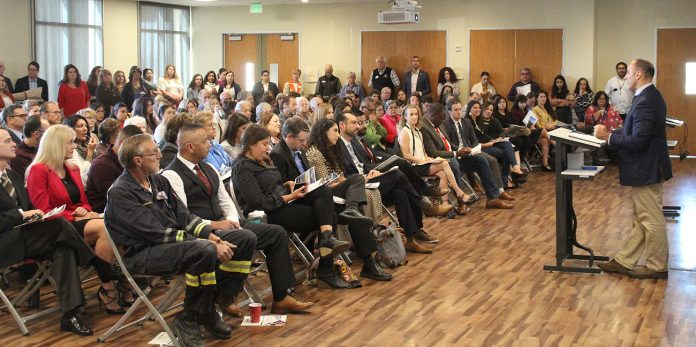
WATSONVILLE—Santa Cruz County has some work to do in the fight against obesity, discrimination and housing inequality. But it’s making steady progress in the diversity of its student body, teenage pregnancy rates and the number of incarcerated young people.
That’s according to the annual Santa Cruz County Community Assessment Project (CAP) presented to a standing-room-only crowd in Watsonville’s Civic Plaza Monday morning.
Conducted and presented by the United Way of Santa Cruz County, the project has for the last 25 years been a valuable tool in highlighting where the county is falling short and where it is excelling in the quality of life for its residents, according to Rep. Jimmy Panetta (D-Carmel Valley).
“This report gives us the evidence we need to do our jobs better in congress, to implement policies that directly affects all of our lives here on the Central Coast,” Panetta said during the press conference.
Panetta, who is up for reelection, met with local high school students from the United Way’s Jovenes SANOS—a youth advocacy and leadership program based in Watsonville that strives to empower, educate and raise awareness about childhood obesity—prior to the press conference at nearby El Valle Produce to hear how they are impacting their community.
“These young men and women are trying to empower their peers, empower their fellow students, educate them and raise awareness about some of the important issues here in our community, especially when it comes to childhood obesity,” Panetta said.
Stephen Gray, chief administrator and operations executive with Sutter Health/Palo Alto Medical Foundation, said the Latino population has the highest rate of being overweight or obese (76.3 percent) in the county, up from 2017 (72.1). In the county overall, 61.7 percent were overweight or obese based on their Body Mass Index, according to the report.
But teenage pregnancies, an issue that Watsonville has struggled with in the past, have continued to decrease. The number of teen moms reached a record low last year of 89, down from 93 in 2017.
The United Way partnered with Applied Survey Research (ASR) to gather data for the report, which this year surveyed 861 residents from around the county—a larger sample size than last year’s report, according to ASR president Susan Brutschy.
Monday’s presentation divided the major findings of the report into six aspects: economy, education, health, public safety, social environment and natural environment.
Thirty-six percent said the cost of living is a factor that affects their quality of life, and 22 percent said homelessness has also impacted their quality of life.
The report also found that 20.7 percent of people surveyed went without one or more basic needs—medical care, food, housing—in the last 12 months. More Latinos (26.2 percent) went without a basic need than whites (17.3), according to the report.
Roughly 86 percent of those surveyed said they trusted local law enforcement, and Watsonville Police Captain Jorge Zamora said that the number of incarcerated young people has steadily dropped over the years. The report showed about 17 juveniles per 1,000 were arrested in 2018, down from 35 juveniles per 1,000 in 2012.
In education, the county has seen a steady drop in chronic absenteeism—students missing 10 percent or more of their education—but there has been an increase in suspensions and expulsions, according to County Office of Education Superintendent Farris Sabbah.
Enrollment at Cabrillo College is dropping slightly but the diversity of the student body has increased, with more than 50 percent being Latino, according to Sabbah.
For the full report, visit unitedwaysc.org.












